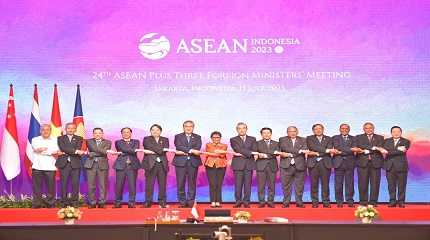
MANILA, July 17 (Xinhua) -- ASEAN countries have reaffirmed their determination to maintain regional peace and stability, and emphasized the need to maintain ASEAN's unity and centrality and avoid becoming any country's proxy.
During the 56th Association of Southeast Asian Nations (ASEAN) Foreign Ministers' Meeting (AMM) and related meetings that concluded last week in Jakarta, Indonesia, the countries in the bloc stated that they would join hands to promote regional economic integration.
Officials and analysts believe that ASEAN shall adhere to the spirit of independence, openness and inclusiveness while focusing on economy and cooperation.
In particular, China and ASEAN, being each other's largest trading partner, would further promote cooperation and achieve progress through the comprehensive strategic partnership.
MUTUALLY BENEFICIAL & WIN-WIN
Indonesia is the rotating chair of ASEAN this year. Aside from the 56th AMM, several multilateral and bilateral activities including China-ASEAN (10+1) Foreign Ministers' Meeting, ASEAN Plus Three (Japan-China-Republic of Korea) Summit and East Asia Summit Foreign Ministers' Meeting were also held in Jakarta.
According to the joint communique of the AMM, further advancing the value and relevance of the ASEAN Outlook on the Indo-Pacific (AOIP) to promote regional peace, security, stability and prosperity is one of the top priorities of ASEAN in 2023. ASEAN is willing to expand relationships with various partners and committed to making itself "an inclusive, participatory and coordinated community."
ASEAN is home to a productive-age population and abundant natural resources, making it a potential epicenter of growth, said Indonesian President Joko Widodo, stressing the necessity to step up cooperation with all sides and embark on a path of mutual benefit and win-win results.
The long-standing peace, stability and prosperity of the ASEAN region are based on an inclusive regional architecture, Indonesian Foreign Minister Retno Marsudi said, calling on ASEAN to continue to stay united and create the regional paradigm of collaboration.
In June, the Regional Comprehensive Economic Partnership (RCEP) became fully effective for all 15 member countries comprising 10 ASEAN countries together with China, Japan, South Korea, Australia and New Zealand. This agreement enables more than 90 percent of regional goods trade to achieve zero tariffs.
Since it took effect, many ASEAN countries' exports to RCEP members have increased significantly. A study by the Philippine Institute for Development Studies predicted that joining the RCEP would increase the Philippines' GDP by 2 percent.
For Lili Yan Ing, a lead advisor at the Economic Research Institute for ASEAN and East Asia (ERIA), the RCEP's full entry into force is "a case in point" of ASEAN's continued expansion of cooperation and opening-up and promotion of economic integration. She said ASEAN allows member countries to seek diverse partnerships, which helps to maintain the cohesion and vitality of the ASEAN community.
NOT A PROXY OF ANY COUNTRY
According to some U.S. media reports, U.S. officials frequently give "warnings" while meeting with ASEAN officials, intending to sow discord between ASEAN and China.
During those meetings, officials from ASEAN countries said that regional countries have no intention of taking sides, insisting on ASEAN centrality. The joint communique of the AMM also emphasized the principle of non-alignment.
Widodo warned that ASEAN couldn't be a competition field, or a proxy of any country, and international law should be respected consistently. ASEAN is committed to strengthening unity and solidity as well as centrality to guard regional peace and stability, he added.
Retno Marsudi stressed that ASEAN shouldn't become a battleground. In addition to being a contributor to economic growth, ASEAN countries must also be a contributor to peace, she said.
The U.S. military deployment in the ASEAN region and its "minilateralism" policies pose a challenge to the centrality of ASEAN, said Veronika Saraswati, a fellow with Indonesia's Centre for Strategic and International Studies (CSIS). In her opinion, the intention of Western countries is not to maintain ASEAN's stability but to divide it. ASEAN should reduce its dependence on the West in the fields of defense and politics.
In an article recently published, Lili Yan Ing wrote that urging ASEAN countries to decouple from China is deeply unfair and short-sighted, because decoupling would undermine trade and economic development within the bloc, fueling political instability across the region.
NEW PROGRESS IN CHINA-ASEAN COOPERATION
This year marks the 20th anniversary of China's accession to the ASEAN Treaty of Amity and Cooperation (TAC). China and ASEAN have actively implemented the purposes and principles of the treaty, and expanded mutually beneficial cooperation on all fronts, walking on the right path of forging long-term good-neighborliness and achieving common development and prosperity.
As neighbors and partners, China and ASEAN have achieved fruitful results in economic and trade cooperation, becoming each other's largest trading partner. Bilateral trade value reached 6.52 trillion RMB (970 billion U.S. dollars) in 2022, a significant year-on-year increase of 15 percent, according to official data. China is also the largest source of foreign investment to several ASEAN countries, and its investment in the region keeps increasing in recent years. On the other hand, the investment from ASEAN into China has also maintained a positive momentum, with a year-on-year growth of 8.2 percent in 2022.
ASEAN officials and scholars are confident that the ASEAN-China comprehensive strategic partnership would continue to grow and achieve new progress.
China and ASEAN's cooperation on the Belt and Road Initiative has brought tangible benefits to both sides, Singaporean Foreign Minister Vivian Balakrishnan said, expecting China and ASEAN to enhance mutual trust, and promote stability and prosperity.
Vietnamese Foreign Minister Bui Thanh Son said Vietnam will continue to promote the Vietnam-China comprehensive strategic cooperative partnership, and Vietnam expects to expand exports to China.
According to Ong Tee Keat, chairman of a Malaysia-based think tank, the Center for New Inclusive Asia and former Malaysian transport minister, China and ASEAN can focus on cooperation in areas such as digital economy, green low-carbon economy and blue ocean economy, in a bid to jointly promote sustainable economic development.




